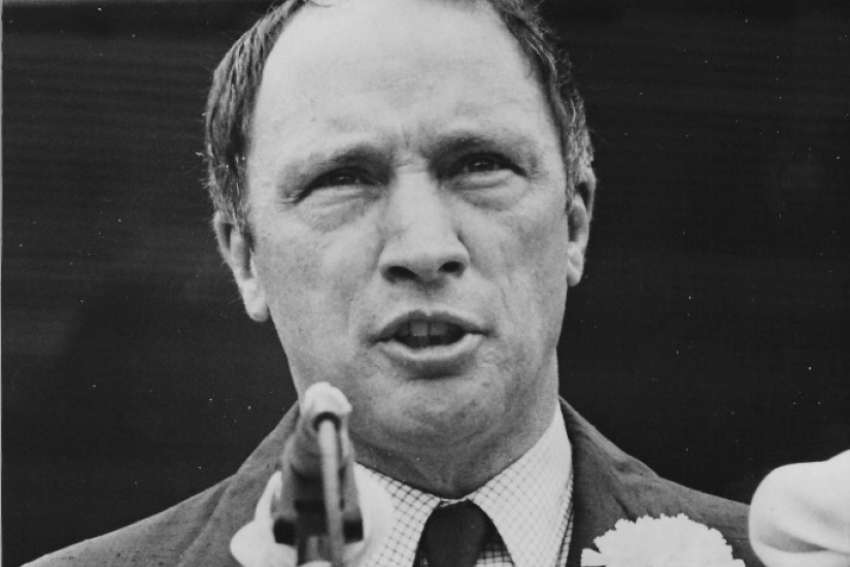At the beginning of his first major press conference as leader of the Liberal Party, the Hon. Pierre Elliott Trudeau showed a fine sense of the niceties when he objected to the title of Prime Minister-elect. A Minister of Justice would be expected to maintain the legal fiction which makes function of First Minister dependent on a call from the Queen’s representative.
But his gesture also revealed a readiness for the unpredictable with which every able politician must be endowed. It was a surprising glimpse of cynicism and a reminder that the new leader will not be easily catalogued. Such a man will obviously possess the inner view of possible lines of conduct that will stand him in good stead in facing the inescapable choices which Canadians present to their leaders. He will find a way out.
This hope probably explains as well as any other motivation why the Liberal Party chose such a man as leader at this time. He has written and spoken of many problems facing the country, but he has especially given constant witness to general convictions and specific flexibility. He appears to sum up in himself most of the major difficulties and hopes and, at the same time, to preserve an aloof freedom that offers a wide choice of solutions. He is reliable enough for the old, adventurous enough for the young.
Canadians have not yet spoken in sufficient numbers to show that he represents their idea of a prime minister for the times. The time spent in serving out the mandate of his predecessor may be decisive in that respect. But, as of now, looking back at two political conventions and two constitutional confrontations, he may justly feel he sums up a new style in Canada.
Mr. Trudeau, at present, will be watched most closely to see if he can overcome three major handicaps.
His first handicap is the widespread suspicion, which he has done little to discourage, that he is not his own man. His candidacy was obviously prepared by others interested in the future of the country; it rallied support of people who because of privileged access to the media, some of it public, are tempted to play kingmaker; it may well have gained momentum from fickle and frothy elements whose loyalty is unstable. With his tendency to “countervail,” Mr. Trudeau can be expected to assert himself with much vigour. Otherwise he will be suspect.
His second handicap has been noticed particularly by deeply bilingual observers. He speaks both languages well, but he is not the same man in each language. He is older in French, his mother tongue. He is less sedate, less doctrinaire, less serious in English. Analysis will likely show that his youthful following is rather Anglo-Saxon. In fact, he and his colleagues of Cite Libre were eventually an “old guard” challenged by young Turks in their own publication. This handicap could lead to misunderstandings by either language group. Enigmas breed distrust.
Mr. Trudeau’s third handicap. much more crucial to the future of the country, lies in his brand of liberalism. He believes in the priority of the human person. That is why he wants to strike down laws which unnecessarily cramp individual conduct. He also, as a fruit of study and travel, has an elevated conception of man as a being, endowed with rights, regardless of creed, culture, race. His vision of a “just society” and of the exigencies of foreign aid show this great humaneness. But he has little grasp of the intermediate way of life, that of the cultural and linguistic group, that of a political party, that of a nation.
It is the price one pays for personal detachment. In this case it is a dangerous weakness because this is precisely the major root and thrust of French-Canadian nationalism, as embodied by Mr. Daniel Johnson. Mr. Trudeau’s vision of unity will bear fruit only if he succeeds as he has not thus far, to flush it out with what he calls regionalism.
He has said he will change. If he does grow to fill the complex requirements of this time and place, he may become one of Canada’s greatest lenders. As prime minister, all Canadians will wish him well.
(To explore The Catholic Register Archive, go to www.catholicregister.org/archive.)
The Register Archive: Sizing up a Trudeau from a different era
By Catholic Register StaffFifty years ago this month, Pierre Elliott Trudeau took the reins of prime minister, eventually serving more than 15 years at the post and shaping much of today’s Canada (not to mention fathering today’s PM, Justin). From The Catholic Register Archive, in the April 20, 1968 issue, here is a perspective on the man just weeks after he was elected leader of the Liberal Party:
Please support The Catholic Register
Unlike many media companies, The Catholic Register has never charged readers for access to the news and information on our website. We want to keep our award-winning journalism as widely available as possible. But we need your help.
For more than 125 years, The Register has been a trusted source of faith-based journalism. By making even a small donation you help ensure our future as an important voice in the Catholic Church. If you support the mission of Catholic journalism, please donate today. Thank you.
DONATE
